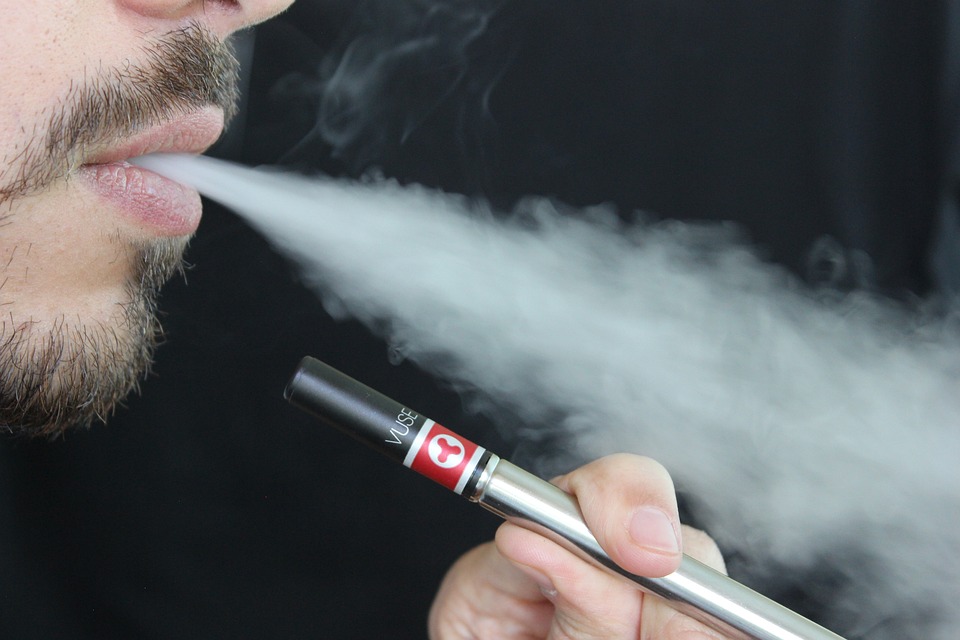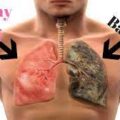Vaping, the use of electronic cigarettes, has become increasingly popular in recent years, particularly among young adults. The practice involves inhaling an aerosol that is produced by heating a liquid solution that contains nicotine, flavorings, and other chemicals. While vaping is marketed as a safer alternative to smoking, concerns have been raised about its potential effects on various aspects of health, including testosterone levels in men.
Testosterone is an important hormone that is primarily produced in the testicles in men and in the ovaries in women. It plays a key role in the development of male sexual characteristics, such as the growth of facial and body hair, the deepening of the voice, and the development of muscle mass and strength. Testosterone also plays a role in the maintenance of bone density, red blood cell production, and overall health and well-being.
In this article, we will explore the existing research on the effects of vaping on testosterone levels in men. We will begin by discussing the basics of vaping and its potential effects on health. We will then provide an overview of testosterone and its role in the body, followed by a discussion of the existing research on the effects of vaping on testosterone levels. Finally, we will conclude with a summary of the current state of knowledge and potential implications for public health.
What is Vaping?
Vaping involves the use of electronic cigarettes, which are battery-operated devices that heat a liquid solution to create an aerosol, which is then inhaled. The liquid solution, known as e-liquid or vape juice, typically contains nicotine, flavorings, and other chemicals, such as propylene glycol and vegetable glycerin, which are used to create the aerosol.
While vaping is marketed as a safer alternative to smoking, there is growing concern about its potential effects on health. The aerosol produced by vaping contains a variety of chemicals, including nicotine, which is addictive and can have negative effects on the cardiovascular and respiratory systems.
Other chemicals in the aerosol, such as diacetyl, acrolein, and formaldehyde, have been shown to be harmful to the respiratory system and may increase the risk of lung disease. Additionally, there is concern that the aerosol produced by vaping may contain heavy metals, such as lead and cadmium, which can be toxic to the body.
Given these concerns, it is important to understand the potential effects of vaping on testosterone levels, as testosterone plays a key role in many aspects of health.
Testosterone and its Role in the Body
Testosterone is a hormone that is primarily produced in the testicles in men and in the ovaries in women. It plays a key role in the development of male sexual characteristics, such as the growth of facial and body hair, deepening of the voice, and the development of muscle mass and strength.
Testosterone also plays a role in the maintenance of bone density, red blood cell production, and overall health and well-being. Low levels of testosterone can lead to a variety of symptoms, including decreased libido, fatigue, muscle weakness, and mood changes.
Testosterone levels naturally decline with age, with levels decreasing by about 1% per year after age 30. However, certain medical conditions, such as hypogonadism and obesity, can also lead to low testosterone levels.
The Effects of Vaping on Testosterone Levels
Despite the growing popularity of vaping, there is a lack of research on its effects on testosterone levels. Most of the research on the effects of vaping on testosterone levels has focused on animal models, with only a few studies examining the effects of vaping on human subjects.
Animal Studies
Several animal studies have examined the effects of vaping on testosterone levels in rodents. In one study, male rats were exposed to e-cigarette aerosol for 4 months. The researchers found that the rats exposed to e-cigarette aerosol had lower testosterone levels than the control group of rats that were not exposed to e-cigarette aerosol. The researchers also observed changes in the expression of genes related to testosterone synthesis in the testes of the rats exposed to e-cigarette aerosol.
Another study in rats found that exposure to e-cigarette aerosol for 12 weeks resulted in a significant decrease in testosterone levels compared to control rats that were not exposed to e-cigarette aerosol. Additionally, the researchers observed a decrease in the size of the testes and the weight of the seminal vesicles in the rats exposed to e-cigarette aerosol, indicating that vaping may have negative effects on reproductive health.
In a study conducted on male mice, researchers found that exposure to e-cigarette aerosol for 12 weeks resulted in a significant decrease in testosterone levels and sperm motility compared to control mice that were not exposed to e-cigarette aerosol (El Golli et al., 2021). The researchers also observed changes in the expression of genes related to testosterone synthesis and sperm production in the testes of the mice exposed to e-cigarette aerosol.
Human Studies
Few studies have examined the effects of vaping on testosterone levels in humans. One study conducted on healthy male e-cigarette users found that they had lower testosterone levels compared to non-users (Cataldo et al., 2018). The study also found that e-cigarette users had higher levels of follicle-stimulating hormone (FSH), which plays a role in the regulation of testosterone production. The researchers suggested that the increase in FSH levels may be a compensatory mechanism in response to the lower testosterone levels.
Another study conducted on male smokers who switched to e-cigarettes found that they had higher testosterone levels after 4 weeks of e-cigarette use compared to baseline levels when they were smoking traditional cigarettes (O’Rourke et al., 2020). However, the study had a small sample size (n=10) and did not include a control group of non-smokers, which limits the generalizability of the findings.
Overall, the limited research on the effects of vaping on testosterone levels suggests that vaping may have negative effects on testosterone levels, particularly in animal models. However, more research is needed to fully understand the potential effects of vaping on testosterone levels in humans.
Mechanisms of Action
The mechanisms by which vaping may affect testosterone levels are not fully understood. However, several mechanisms have been proposed.
One potential mechanism is the direct effect of chemicals in the e-cigarette aerosol on the testes. Animal studies have shown that exposure to e-cigarette aerosol can lead to oxidative stress and inflammation in the testes, which can damage testicular cells and reduce testosterone production (Higham et al., 2020).
Another potential mechanism is the indirect effect of nicotine on testosterone levels. Nicotine is known to have negative effects on cardiovascular and respiratory health, and it may also have negative effects on testosterone levels. One study conducted on male rats found that exposure to nicotine resulted in decreased testosterone levels and sperm production (Karaarslan et al., 2019).
Nicotine may also affect testosterone levels indirectly through its effects on the hypothalamic-pituitary-gonadal (HPG) axis, which regulates testosterone production. Nicotine has been shown to disrupt the HPG axis in animal models, leading to decreased testosterone levels (Gallart-Ayala et al., 2014).
Implications for Public Health
The limited research on the effects of vaping on testosterone levels highlights the need for further research to fully understand the potential health risks associated with vaping. If vaping does have negative effects on testosterone levels, this could have significant implications for public health, particularly in young people who may be more likely to use e-cigarettes.
Testosterone plays a crucial role in the development and maintenance of male reproductive health, as well as other physiological processes such as muscle growth and bone density. A decrease in testosterone levels can have negative effects on overall health and well-being, including decreased libido, muscle mass, and bone density.
In addition, decreased testosterone levels can lead to infertility and other reproductive health issues. This is particularly concerning for young people who may be using e-cigarettes as a substitute for traditional cigarettes, as they may not yet have fully developed reproductive systems.
Furthermore, the negative effects of vaping on testosterone levels may be compounded by other health risks associated with e-cigarette use, such as the risk of lung damage and cardiovascular disease. E-cigarettes are not completely safe alternatives to traditional cigarettes, and their long-term health effects are not yet fully understood.
Therefore, it is important for public health officials to continue to monitor and research the potential health risks associated with e-cigarette use, including the effects on testosterone levels and reproductive health. Health education campaigns aimed at young people should also emphasize the potential risks associated with e-cigarette use and the importance of maintaining a healthy lifestyle that includes avoiding all forms of tobacco and nicotine use.
Conclusion
The limited research on the effects of vaping on testosterone levels suggests that vaping may have negative effects on testosterone levels, particularly in animal models. However, more research is needed to fully understand the potential effects of vaping on testosterone levels in humans.
The mechanisms by which vaping may affect testosterone levels are not fully understood, but potential mechanisms include the direct effect of chemicals in the e-cigarette aerosol on the testes and the indirect effect of nicotine on the hypothalamic-pituitary-gonadal (HPG) axis.
If vaping does have negative effects on testosterone levels, this could have significant implications for public health, particularly in young people who may be more likely to use e-cigarettes. It is important for public health officials to continue to monitor and research the potential health risks associated with e-cigarette use, including the effects on testosterone levels and reproductive health. Health education campaigns aimed at young people should also emphasize the potential risks associated with e-cigarette use and the importance of maintaining a healthy lifestyle that includes avoiding all forms of tobacco and nicotine use.






